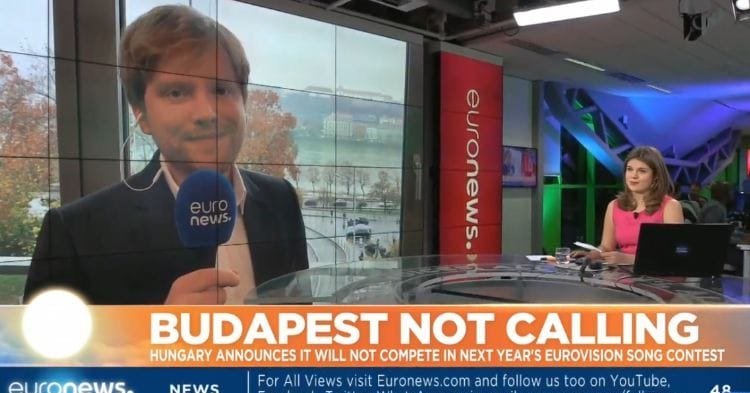Ádám Magyar is a young journalist at Euronews based in Budapest. Interested in international relations and a keen writer, it seemed a natural profession to follow. Kimberley Mannion from The New Federalist spoke to him to find out what it is like to begin a journalism career in such a hostile climate.
Working for Euronews, Adam is a minority of independent journalists in the country. As an international outlet, some of the challenges which other independent journalists may have against Orbán’s administration are not so great for the company. It mostly covers foreign news, which does not attract a huge audience in the country, so the government does not see it as such an “important enemy”, in Adam’s words. Moreover, it has the backing of the EU behind it, which is worth something in the fraught relationship between the country and the union.
Media in Hungary has grown more and more centralised over the years. In 2018, around 400 outlets were conglomerated to become KESMA - Central European Press and Media Foundation, their coverage increasingly sympathetic to Prime Minister Orbán and the ruling party, Fidesz.
“In all of these outlets, the message on any given topic is the same, because it is chosen by the government,” says Adam. Some of the most popular online news outlets remain independent, but those who do not have access or actively look for it will only ever hear exactly what the government wants them to.
At a recent press conference, Orbán mentioned new information that would be important to many citizens - that they would not know which version of the vaccine they would receive until they got to the site, and if they didn’t fancy the version they were given, they could join the back of the queue.
Despite clearly being newsworthy, this comment was not reported in the government friendly press - who were almost the only ones allowed to attend the conference. Independent journalists like Adam only found out as the Associated Press agency attended and recorded it in its entirety. A few days later a minister declined the claim and said the opposite. “The Prime Minister probably made a mistake,”, regarding the information, guesses Adam. Lack of transparency and mixed messaging have been themes for the Hungarian government throughout the pandemic.
The daily job of a journalist is significantly more difficult for Adam than for Euronews colleagues positioned in another member state that enjoys more favourable conditions for the press. It is often difficult to get the information needed for a story, because the government withholds it and will not talk to journalists from outside the centralised media block.
“Of course journalists must be objective, but it is hard when you cannot get a viewpoint from the government on issues they do not wish to speak about,” explains Adam. Independent outlets like Euronews want to show the full picture of a story with its nuance, but this goal is often impossible to achieve in Hungary.
During the Covid-19 crisis, outlets like Euronews would have liked to film in hospitals on Covid’s front line, sensitising people into taking the pandemic seriously, as was done by teams like Sky News when Italy was the first country in Europe to experience the wrath of the deadly virus. Their report was much acclaimed in making people seriously reflect and change their behaviour, realising that this was no ordinary flu. Adam’s team at Euronews has been able to report from a Slovakian hospital, which they felt was an important piece of journalism. Despite repeated requests, permission for such reporting was never granted from the Hungarian government.
Like governments across the world, Hungary wanted to help its arts sector, one of the worst hit by the economic impact of the recession. So it sponsored bands to perform concerts. This did not go without controversy and more secrecy - one of the invited bands played anti-government songs, one of which is entitled ‘Viktor’. The final recording had of course censored these songs out.
An actor who participated in the band’s performance was allegedly beaten after the concert, reporting the incident on Facebook. “This is yet another topic I wanted to ask the government about, because we only have one side of the story, but I didn’t get a response,” Adam says. A journalist cannot give a balanced account of an event if one side will not engage.
The way the government controls the country’s media is through advertising money. They pump money into the loyal outlets, their pages adorned with government-funded adverts. Hungary is a relatively small market and thus few independent companies want to invest a lot in advertising in their media. Independent journalists can write what they like, they are not threatened and their physical safety never in danger - it is the starvation of funds which kills more and more of their outlets.
Index, one of the largest online independent media sources, was taken over by an entirely different personnel last year in what was a huge blow for supporters of press freedom. The situation is not black and white in that the government forced the overhaul - rather the companies financing them were taken over by government supporters, which led to the board firing the Editor-in-Chief and staff journalists resigning.
Adam is not hopeful when discussing the future of the media in Hungary. More and more independent outlets are closing each year, and the Hungarian Media Council is populated with Fidesz loyalists. “If this trend continues, it becomes harder and harder to find a place to work if you want to be an independent journalist. That’s why I consider myself very lucky to be working at Euronews. There are lots of independent journalists who want to work, but they have fewer and fewer places to do so.”


Follow the comments: |
|
